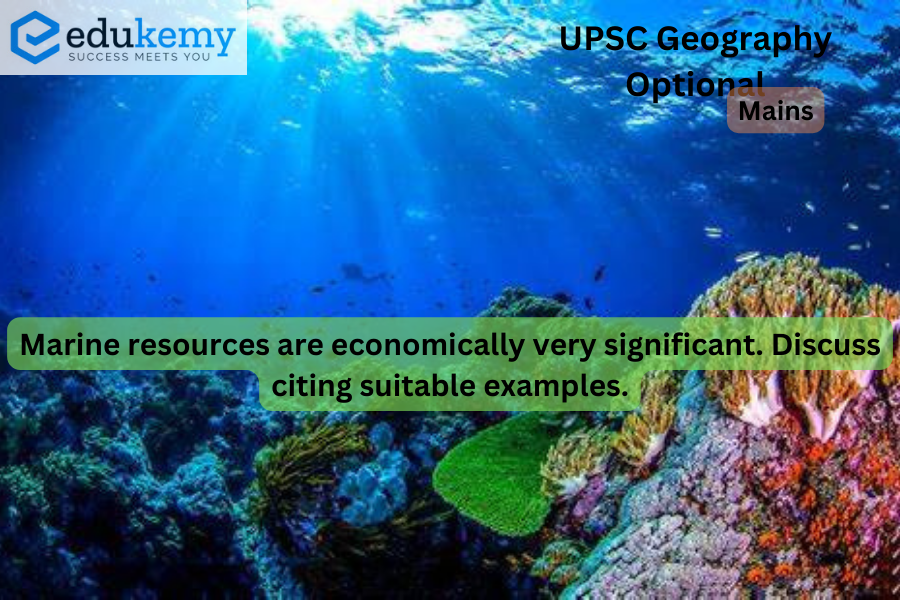Marine resources are the different living and non-living resources that can be used for a variety of purposes and are located in the oceans and seas. These resources are essential for the health of economies, ecosystems, and people. Living (biotic) and non-living (abiotic) resources are the two main categories into which marine resources can be divided.
Contents
- 0.0.1 Marine resources are very significant economically and their significance can be understoodin following points:
- 0.0.2 Fisheries and Aquaculture as an important economic driver
- 0.0.3 Coral Reefs’ massive role in the global economy
- 0.0.4 Offshore oil production and its economic significance
- 0.0.5 Marine renewable energy and its economic significance
- 0.0.6 Marine Tourism and its economic significance
- 1 To get free counseling/support on UPSC preparation from expert mentors please call 9773890604
Marine resources are very significant economically and their significance can be understood
in following points:
Fisheries and Aquaculture as an important economic driver
- FAO estimates that around 58 million people were employed worldwide in primary fish production alone in 2020, with 21% being women.
- oThe estimated total farm gate value of fisheries and aquaculture reached around USD 280 billion in 2020.
Coral Reefs’ massive role in the global economy
- National Oceanic and Atmospheric Administration (NOAA) estimates that coral reefs in southeast Florida alone contribute around $4 billion in local sales and $2 billion in local income, supporting over 70,000 jobs.
- Coral reefs act as nurseries and breeding grounds for many fish species, providing crucial habitat and food sources for commercially important fish stocks.
- The National Marine Fisheries Service estimates the annual commercial value of U.S. fisheries from coral reefs to be over $100 million.
Offshore oil production and its economic significance
- Offshore oil production generates significant revenue for governments through royalties, taxes, and lease sales. For example, in the United States the offshore oil and gas industry contributed over $30 billion to the U.S. economy in 2016 through various economic activities.
- The industry directly and indirectly creates jobs in various sectors, including Rig workers, engineers, geologists, and technicians involved in exploration, drilling, and production etc.

Marine renewable energy and its economic significance
- The International Renewable Energy Agency estimates that the marine renewable energy sector could support over 800,000 jobs globally by 2050.
- The sector requires significant investments in research and development, infrastructure development (e.g., offshore wind farms, tidal energy projects), and grid modernization, leading to economic opportunities in construction, engineering, and related sectors.
- According to reports, the global investment in offshore wind energy alone reached USD 33 billion in 2022
Marine Tourism and its economic significance
- Marine tourism includes activities like diving, snorkelling, cruising, and wildlife watching, plays a major role in the global economy.
- World Travel & Tourism Council estimates the global ocean tourism sector contributed USD 2 trillion to the global economy in 2019
- The sector directly and indirectly employs millions of people globally in various sectors like transportation, accommodation, food service, tour operations
- It often drives investments in infrastructure development in coastal areas, including hotels, resorts
These marine resources face challenges of varying degrees due to myriad reasons ranging from over exploitation of marine resources to marine pollution and degradation to climate change. However, Countries have been taking proactive steps to harness marine resources to fullest for eg. Deep ocean mission, Sagarmala programme, O-smart scheme, National Fisheries Development Board (NFDB), Marine Products Export Development Authority (MPEDA) by Indian government-a step in right direction
To get free counseling/support on UPSC preparation from expert mentors please call 9773890604
- Join our Main Telegram Channel and access PYQs, Current Affairs and UPSC Guidance for free – Edukemy for IAS
- Learn Economy for free- Economy for UPSC
- Mains Answer Writing Practice-Mains Answer Writing
- For UPSC Prelims Resources, Click here

